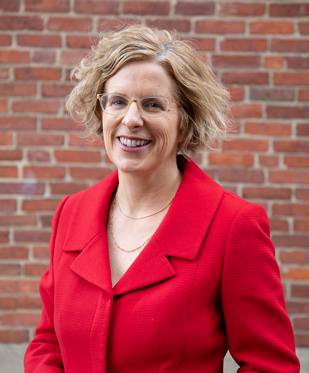We spoke with Ingrid Katz, Associate Faculty Director, Harvard Global Health Institute; Associate Professor, Harvard Medical School; Associate Physician, Brigham and Women’s Hospital, and one of the members of our 2020 Leadership Journey. Read our Q&A to learn about her Leadership Journey Project, her briefing with President Biden and Dr. Biden on the impact of COVID, and how she believes we can ensure women are at the center of pandemic recovery plans.
What is your Leadership Journey Project and why did you choose it?
I chose to focus my Leadership Journey Project on developing a Strategic Plan for the Harvard Global Health Institute, where I am the Associate Faculty Director. I had originally intended to do a slightly different project, but we are at an inflection point at The Institute, and now, more than ever, it is important for us to have a clear and cohesive strategy of how we are approaching the multiple global health crises upon us, and how to best support our large and robust community of global health scholars, researchers, students, and educators across the University.
What has surprised you about the WomenLift Health Leadership Journey experience?
I think we are all a bit heartbroken that we have not been able to spend time together in person, due to the Covid-19 pandemic. What has surprised me is how incredibly connected I feel to these women, despite the distance between us. During this time, I have been fortunate to stay connected to my longtime research collaborators, but I had not anticipated I could form new connections in this way. The team at WomenLift Health has done such a phenomenal job of ensuring we are staying connected and in conversation throughout this time. It has been such a joy in all possible ways to be part of this experience.
How has COVID shifted the focus of your work?
Covid-19 has touched almost every aspect of what I do. I am trained in Infectious Diseases, and public health, so in many ways, I feel deep gratitude for having expertise that is of use during this time. I look back to Jan/Feb of 2020 – and I see some emails and Tweets I was putting out there that were expressing my concern about what was to come. So many of us were watching this unfold and were hoping it could be contained. But it was quickly clear that Covid would be unlike anything else we had experienced in our lifetime due to a multitude of factors, including how transmissible this virus is, the nature of asymptomatic spread, the fact that it is airborne, and, of course, how interconnected we are as a global community.
My career, like so many others, took a 90 degree turn to focus on this issue. I have tried to remain active in this space in any way I can contribute – whether through media appearances, writing in both the lay press and in medical journals, or lobbying for vaccine equity. I had the honor of briefing President Biden and Dr. Biden on the impact of Covid on education, and then co-led a course at Harvard College with my colleague, Professor Allan Brandt, on Covid-19 in the Fall of 2020.
My work over the last decade has primarily centered on the other global pandemic that we are still experiencing – now 40 years in – that of HIV. Pandemics shine a light on the inherent inequalities that we face, globally. We have seen this in the HIV pandemic, and we are seeing this in the Covid-19 pandemic. It is why I remain committed to this work and will continue to do so for as long as I can continue to serve a useful role.
How can we ensure that women are at the center of not only COVID recovery plans but also long-term strategies for the improvement of health?
It really takes a clear and firm commitment to centering women’s voices in conversations. It requires intentionality. WomenLift is an example of centering women’s voices and providing us with an opportunity to flourish. At the Harvard Global Health Institute, we remain committed to this work by supporting a fellowship for women who are global health leaders in low- and middle-income countries. Our goal is to ensure women get a chance to come to Harvard and immerse themselves for a semester in courses that will further their careers as leaders, while providing them with leadership training. These women then return to their home country, where they continue to be mentored throughout the year, while completing a scholarly project. We are currently accepting applications for our third year of The LEAD Fellowship.
Who inspires you?
I am very lucky to be married to the woman who inspires me every day. My wife, Alexi Wright, is an oncologist at Dana Farber Cancer Institute in Boston. She and I trained together at Brigham and Women’s Hospital and were the first openly gay couple to match at any of the Harvard affiliated hospitals when we started our internal medicine residency. The care and compassion she has for her patients is boundless. She has always taught me that deep work matters – and there is no match for dedication, perseverance, and a little elbow grease to get the job done. She is an unrelenting optimist and an incredibly loving parent to our 13-year old son (and our sweet pandemic puppy!). I really couldn’t imagine anyone I would rather walk through this life with.


